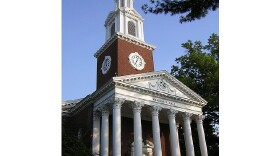UK Now
-
Although most cases of Lyme disease can be cured with a two-to-four-week course of antibiotics, some patients still experience lingering, debilitating effects of the disease months after they finish treatment. Dr. Greg talks with Ilhem Messaoudi, Ph.D., and Brian Stevenson, Ph.D., in the Department of Microbiology, Immunology and Molecular Genetics, about a new study seeking to understand if the antibiotic regimen used to treat Lyme disease could also be contributing to Post-Treatment Lyme Disease Syndrome (PTLDS), which includes ongoing symptoms of pain, fatigue or difficulty thinking.
-
With fragile branches and stinky flowers, Bradford pear trees are popular ornamentals, but they’re quick to crowd out native species. As WUKY’s Arlo Barnette reports, a program at the University of Kentucky is helping homeowners replace them.
-
Cancer is the second leading cause of death in the United States, and Kentucky is home to the highest rates of cancer incidence and mortality in the country. The problem is significantly concentrated in the Appalachian region of the state, an area widely known for its culture and history of tobacco growth and use. This week Dr. Greg talks to Nathan Vanderford, director of the Markey Cancer Center’s Appalachian Career Training in Oncology or ACTION program.
-
Cancer is the second leading cause of death in the United States, and Kentucky is home to the highest rates of cancer incidence and mortality in the country. The problem is significantly concentrated in the Appalachian region of the state, an area widely known for its culture and history of tobacco growth and use. This week Dr. Greg talks to Nathan Vanderford, director of the Markey Cancer Center’s Appalachian Career Training in Oncology or ACTION program.
-
The University of Kentucky will be closed on Thursday, Feb. 3 due to inclement weather. In-person classes will not take place on campus. Ifstudents have questions about their class status, they should contact their instructor.
-
The University of Kentucky is participating in a nationwide study that seeks to understand why some people have prolonged symptoms (long COVID) or develop new or returning symptoms after an acute bout of SARS-CoV-2 infection. Dr. Greg Davis talks with Zach Porterfield, M.D., Ph.D.,assistant professor in the UK Department of Microbiology, Immunology and Molecular Genetics, who is co-leading the study.
-
The University of Kentucky is participating in a nationwide study that seeks to understand why some people have prolonged symptoms (long COVID) or develop new or returning symptoms after an acute bout of SARS-CoV-2 infection. Dr. Greg Davis talks with Zach Porterfield, M.D., Ph.D., assistant professor in the UK Department of Microbiology, Immunology and Molecular Genetics, who is co-leading the study.
-
Alex Flannery worked as a clinician in the intensive care unit for six years. During his tenure in critical care, the University of Kentucky College of Pharmacy assistant professor and 2011 graduate, saw many cases of sepsis and acute kidney injury, which have no cure. Flannery’s background in pharmacology sparked an interest in learning more about how to treat these diseases. He talks about what he's learned on this week's edition of Dr. Greg Davis on Medicine.
-
Lexington’s annual celebration and commemoration of the Martin Luther King Jr. holiday will take place Monday, Jan. 17, 2022. The Freedom March will begin at 10 a.m. at the Lexington Central Bank Center, and a virtual program will now take place at noon, on YouTube. The program following the march was originally scheduled to take place in-person, but has been changed due to the rising number of COVID-19 cases.









